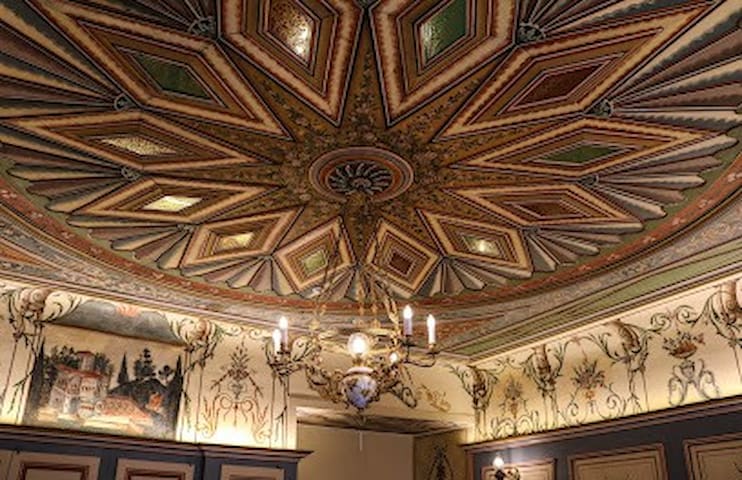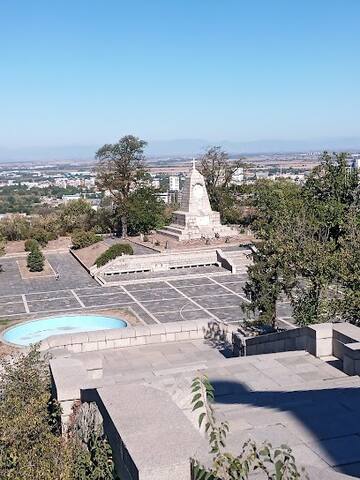Sightseeing
Bulgarian cultural museum in a grand 19th-century building with art, musical instruments & costumes.
32 người dân địa phương đề xuất
Bảo tàng Dân tộc học Vùng Plovdiv
2 ul. "Doctor Stoyan Chomakov"Bulgarian cultural museum in a grand 19th-century building with art, musical instruments & costumes.
The Klianti House is an undisputed peak in the development of architecture and decorative art in the Old Plovdiv. The rich artistic decoration is concentrated in the residential floor, wherein are many wooden sculptures and polychrome – geometric patterns and colorful inlays – on the wooden ceilings, unique landscapes dating from 1817 and monumental compositions of vegetable ornaments. On the walls there are richly decorated niches, cupboards, backgammon wooden doors.
House-Museum Klianty
3 ulitsa "Todor Samodumov"The Klianti House is an undisputed peak in the development of architecture and decorative art in the Old Plovdiv. The rich artistic decoration is concentrated in the residential floor, wherein are many wooden sculptures and polychrome – geometric patterns and colorful inlays – on the wooden ceilings, unique landscapes dating from 1817 and monumental compositions of vegetable ornaments. On the walls there are richly decorated niches, cupboards, backgammon wooden doors.
The Regional Archaeological Museum in Plovdiv, Bulgaria (RAM – Plovdiv) is one of the first Bulgarian cultural institutions, officially opened in 1882
19 người dân địa phương đề xuất
Regional Archaeological Museum Plovdiv
1 pl. "Saedinenie"The Regional Archaeological Museum in Plovdiv, Bulgaria (RAM – Plovdiv) is one of the first Bulgarian cultural institutions, officially opened in 1882
The Alley of Astronauts loosely bounds both monuments, the first pine-tree here having been planted by Yuri Gagarin himself back in 1961.
The Astronaut Alley
The Alley of Astronauts loosely bounds both monuments, the first pine-tree here having been planted by Yuri Gagarin himself back in 1961.
The House of Hindliyan is one of the most representative sample of Renaissance in Balkans in Bulgaria. It mixes a lot of different cultural elements (Ottoman, ...
House-Museum Hindlian
4 ul. "Artin Gidikov"The House of Hindliyan is one of the most representative sample of Renaissance in Balkans in Bulgaria. It mixes a lot of different cultural elements (Ottoman, ...
"Експозиция „Българско Възраждане” е подредена в една от най-красивите и емблематични къщи на Старинен Пловдив – тази на Димитър Георгиади. Сградата е типична пловдивска възрожденска къща от XIX век с китен двор, приземие, три етажа, разноцветно изписани стени, майсторски резбовани тавани и така характерните декоративни ниши – „алафранги”. Експозицията проследява историята на град Пловдив от XV до XIX век. Художественото оформление при подредбата на експонатите не накърнява вътрешната архитектура на къщата и потапя посетителите във времена на чуждо владичество, но и времена на отстояване на националната идентичност на българите."
Historical Museum - Exhibition Renaissance
1 ul. "Tsanko Lavrenov""Експозиция „Българско Възраждане” е подредена в една от най-красивите и емблематични къщи на Старинен Пловдив – тази на Димитър Георгиади. Сградата е типична пловдивска възрожденска къща от XIX век с китен двор, приземие, три етажа, разноцветно изписани стени, майсторски резбовани тавани и така характерните декоративни ниши – „алафранги”. Експозицията проследява историята на град Пловдив от XV до XIX век. Художественото оформление при подредбата на експонатите не накърнява вътрешната архитектура на къщата и потапя посетителите във времена на чуждо владичество, но и времена на отстояване на националната идентичност на българите."
Established in 1951, it covers the history of Plovdiv from the 15th century until today (the older history is presented in the Plovdiv Archaeological Museum).
6 người dân địa phương đề xuất
Plovdiv Regional Historical Museum
1 pl. "Saedinenie"Established in 1951, it covers the history of Plovdiv from the 15th century until today (the older history is presented in the Plovdiv Archaeological Museum).


